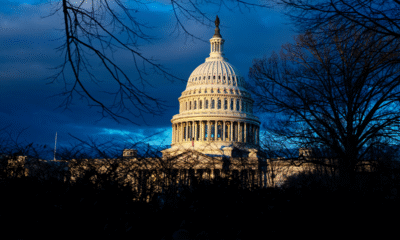INTERNACIONAL
WATCH: Dem senator agrees with GOP that Trump’s making progress on trade war
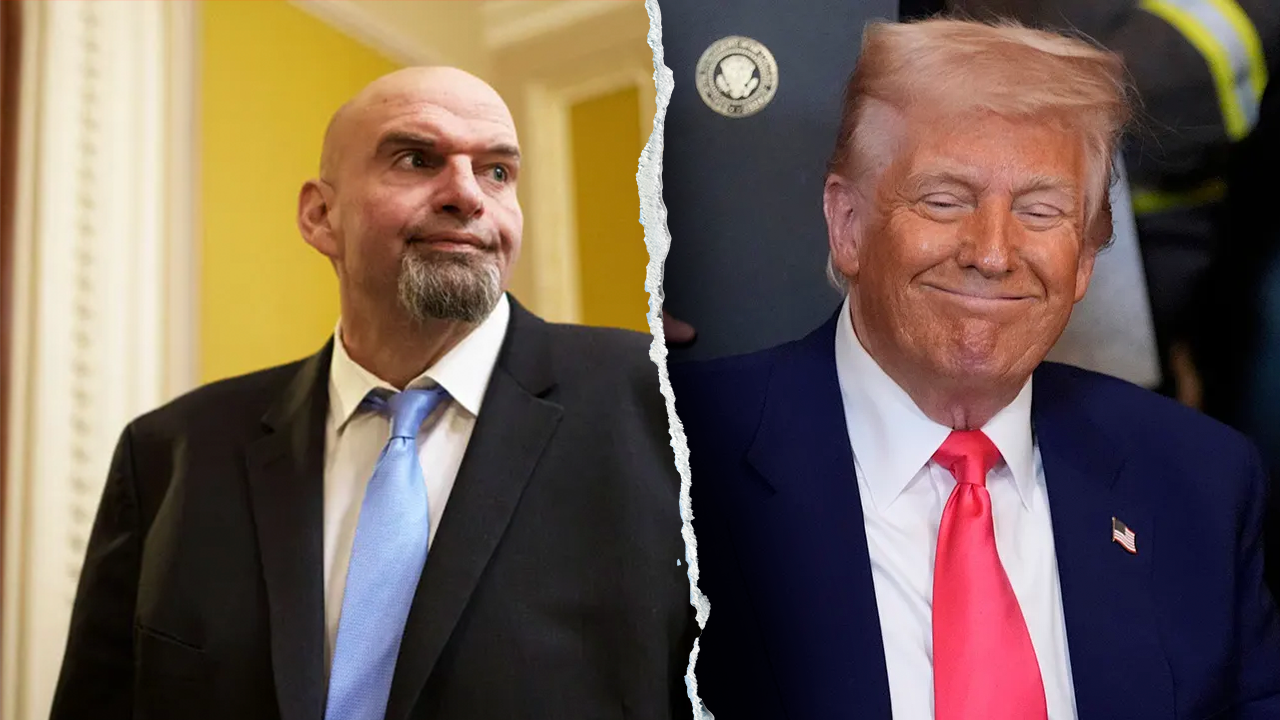
NEWYou can now listen to Fox News articles!
Pennsylvania Democratic Sen. John Fetterman admitted that his party had gotten it wrong about President Donald Trump’s tariffs, saying that, so far, the U.S. trade war is «going well.»
Asked by Fox News Digital whether he thought the Trump administration was winning the trade war, Fetterman responded, «Absolutely.»
«I’m a huge fan of Bill Maher, and I mean, I think he’s really one of the oracles for my party, and he acknowledged it, it’s like, hey, he thought that the tariffs were going to tank the economy, and then he acknowledged that it didn’t,» said Fetterman.
«So, for me,» he went on, «it seems like the E.U. thing has been going well, and I guess we’ll see how it happens with China.»
This comes as Trump is increasing the tariff on Canada from 25% to 35% beginning on Friday, after the U.S. neighbor to the north failed to help curb the imports of fentanyl and other illicit drugs. The White House noted that Trump signed an executive order on Thursday to increase the tariff in an effort to hold Canada accountable for its role in the flow of illicit drugs into the U.S.
Additionally, Trump signed another executive order on Thursday to modify the reciprocal tariff rates for some countries to further address the United States’ trade deficits. The action reflects Trump’s efforts to protect the U.S. from foreign threats to national security and the economy by securing «fair, balanced and reciprocal trade relationships,» the White House said.
TRUMP AIMS TO RESHAPE GLOBAL ECONOMY WITH HISTORIC NEW TARIFFS
Pennsylvania Democratic Sen. John Fetterman admitted that his party had gotten it wrong about President Donald Trump’s tariffs, saying that, so far, the U.S. trade war is «going well.» (AP/Alex Brandon and Drew Angerer/Getty Images)
Earlier this year, Trump announced an additional 10% tariff on all countries as well as higher tariffs for countries the U.S. has large trade deficits with. The tariffs became effective on April 9. Since then, Trump and his team have since made several trade deals with several countries.
The U.S. struck a deal with the European Union in which the EU agreed to purchase $750 billion in U.S. energy and make new investments of $600 billion by 2028. The EU also agreed to accept a 15% tariff rate. The U.S. also made a deal with Japan, which agreed to invest $550 billion in the U.S. to rebuild and expand core American industries. Japan also agreed to further its own market to U.S. exports, and like the EU, Japan agreed to a baseline 15% tariff rate.
However, many Democrats are digging in their heels against Trump’s tariffs strategy, saying the negative effects are still on the horizon.
Sen. Jack Reed, D-R.I., forecast that, despite the increased revenue, «within a few weeks or months, you’ll start seeing significant increases in most things you buy. And also, you will see disruption in terms of a lot of our industries, because they’re not able to access product or supply.»
TRUMP IMPOSES SWEEPING TARIFFS ON DOZENS OF COUNTRIES AFTER LANDING MASSIVE TRADE DEALS
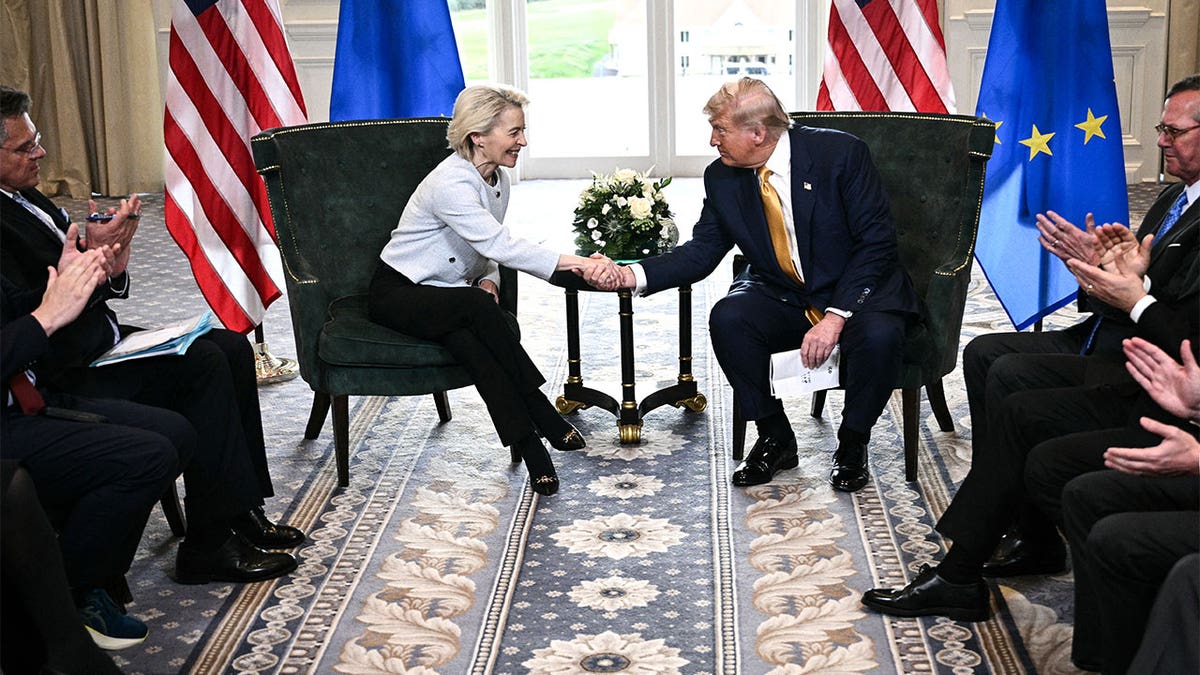
President Trump shakes hands with European Commission President Ursula von der Leyen after signing a trade deal, July 27, 2025, in Turnberry, Scotland. (Getty Images)
«When you have across-the-board tariffs, it does operate like a national sales tax, and I think people are going to be more and more hurt,» predicted Sen. Chris Van Hollen, D-Md.
«This is the president who said he was going to come in and reduce prices. Prices are going to rise, and they’re going to rise more over time,» said Van Hollen.
Massachusetts Democratic Sen. Elizabeth Warren said that «Donald Trump may beat his chest and say, ‘Man, I made him take a 15% tariff or 25% tariff,’ but also understand that every one of those trading partners is now looking hard all around the rest of the world to find other customers, because Donald Trump is signaling loud and clear that the United States under Donald Trump is not a reliable trading partner. And that’s not good for any of us.»
Warren also claimed that Trump’s tariffs are the reason the Federal Reserve has not lowered U.S. interest rates.
«Jerome Powell said last month that he would have lowered interest rates back in February if it hadn’t been for the chaos that Donald Trump was creating over trade. And the consequence has been that American families have, for six months now, been paying more on credit cards, more on car loans, more home mortgages, all because Donald Trump has created chaos,» she said.
US-CHINA TRADE DEAL ON THE HORIZON, SAYS TREASURY SECRETARY
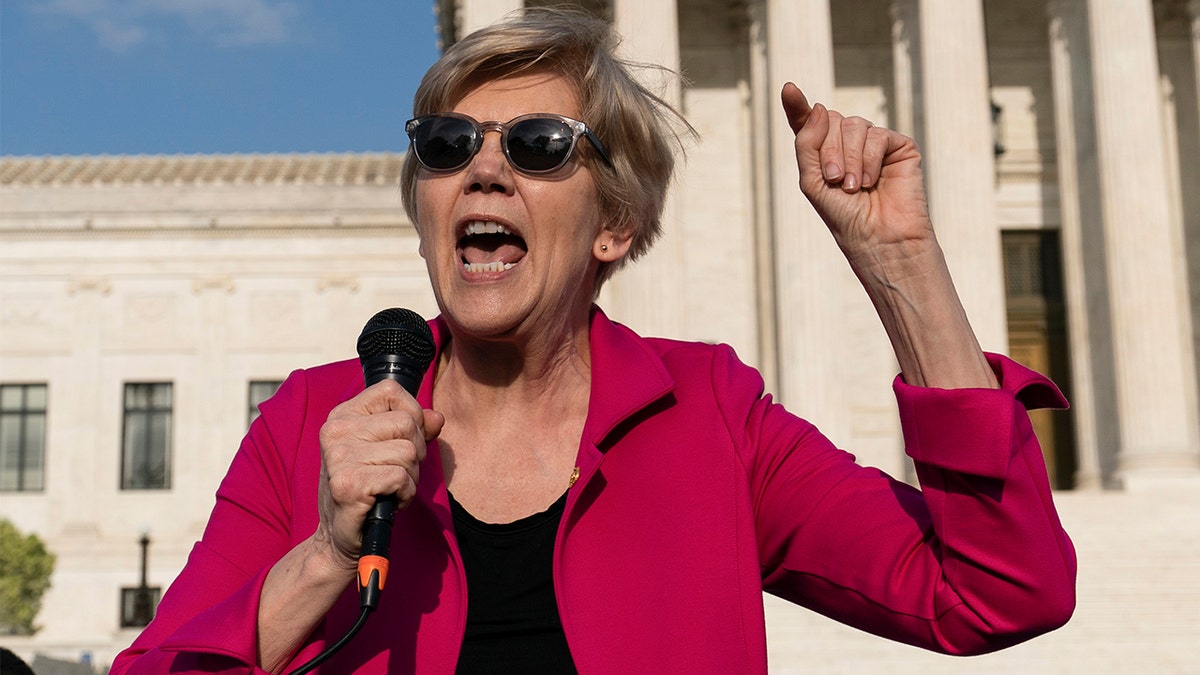
Sen. Elizabeth Warren, D-Mass., speaks during a protest outside of the U.S. Supreme Court on Tuesday, May 3, 2022, in Washington. (AP Photo/Alex Brandon)
Meanwhile, Republicans whom Fox News Digital spoke with urged the president to double down on his tariff strategy.
«I think it’s exactly the right approach. It’s what I have been urging the president to do, and I think the successes he’s winning are big wins for America,» said Sen. Ted Cruz, R-Texas.
In response to Democrats still predicting economic fallout because of the tariffs, Cruz sarcastically remarked, «I’m shocked, shocked that Democrats are rooting for the economy to do badly under President Trump.»
«It’d be nice if some Democrats would put their partisan hatred for Trump aside and actually start working together for American workers and American jobs. Unfortunately, I don’t see a whole lot of Democrats interested in doing that right now,» said Cruz.
Sen. John Kennedy, R-La., while agreeing that the tariffs have been successful, voiced that he hopes the goal is to ultimately achieve reciprocal zero percent tariffs between the U.S. and its trade partners.
DEMOCRATIC SENATOR ADDRESSES WHETHER KAMALA HARRIS HAS REACHED THE END OF HER POLITICAL CAREER
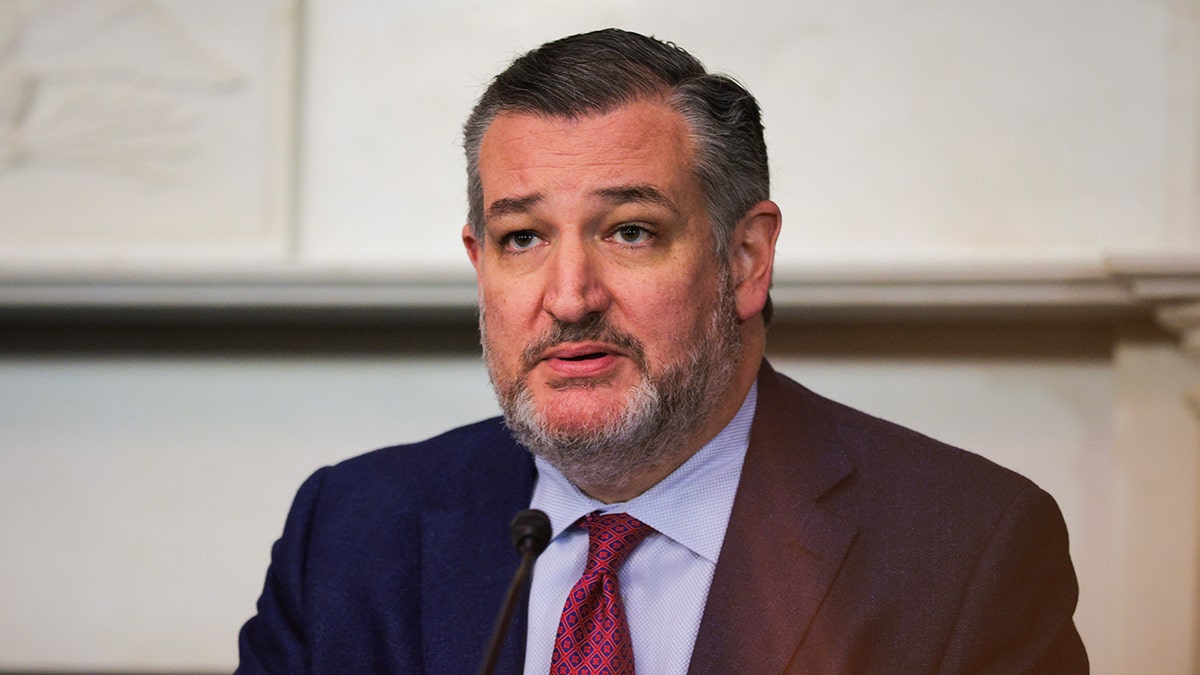
«I think it’s exactly the right approach. It’s what I have been urging the president to do, and I think the successes he’s winning are big wins for America,» said Sen. Ted Cruz, R-Texas. (Kayla Bartkowski/Getty Images)
«Clearly, the president got a good deal from one perspective. The Europeans just caved, they did. Fifteen percent tariffs on them, zero on us, commitment to invest in our country. But the part of the deal I like the most, the E.U. and the president agreed that a whole bunch of goods would be tariff-free. That is, no American tariffs and no E.U. tariffs. It’s called reciprocity, and ideal reciprocity is zero on both sides,» he explained.
CLICK HERE TO GET THE FOX NEWS APP
«That’s what I would like us to achieve in all the trade deals,» Kennedy explained. «Let the free enterprise system work. May the best product at the best price win. That, to me, would be the perfect situation.»
Fox News Digital’s Greg Wehner contributed to this report.
john fetterman,donald trump,trade,democratic party,executive policy
INTERNACIONAL
JD Vance says government likely ‘headed into a shutdown’ after Trump meets with Dems
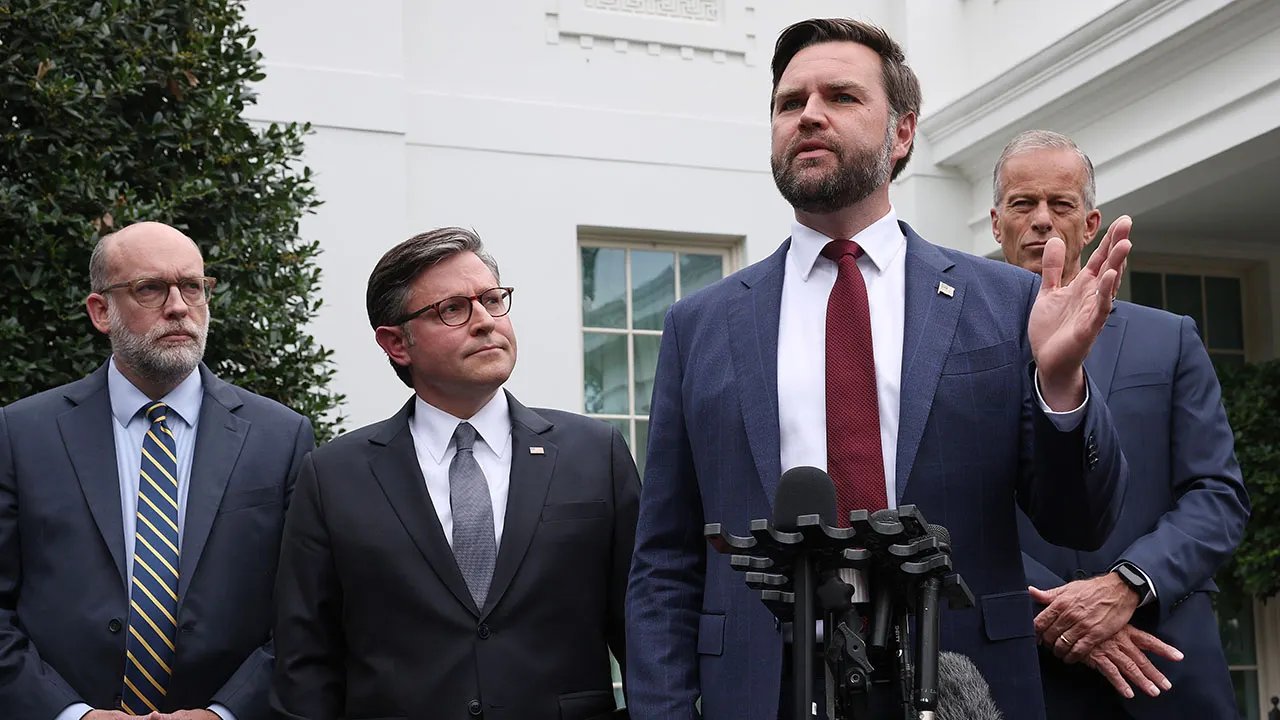
NEWYou can now listen to Fox News articles!
Republican and Democratic congressional leaders left a meeting with President Donald Trump with no deal to avert a government shutdown as the deadline fast approaches.
Leaders met with Trump on Monday for roughly an hour to negotiate a path forward to avert a partial government shutdown, but it appeared neither side was willing to budge from their position.
Vice President JD Vance said after the meeting, «I think we’re headed into a shutdown because the Democrats won’t do the right thing. I hope they change their mind.»
«If you look at the original they did with this negotiation, it was a $1.5 trillion spending package, basically saying the American people want to give massive amounts of money, hundreds of billions of dollars to illegal aliens for their health care, while Americans are struggling to pay their health care bills,» Vance said. «That was their initial foray into this negotiation. We thought it was absurd.»
DEMS NOT BUDGING ON GOVERNMENT SHUTDOWN DEMANDS AHEAD OF HIGH-STAKES TRUMP MEETING, JEFFRIES SUGGESTS
Vice President JD Vance, Speaker Mike Johnson, R-La., Senate Majority Leader John Thune, R-S.D., and Office of Management and Budget Director Russ Vought spoke to reporters after congressional leaders met with President Donald Trump on Sept. 29, 2025. (Win McNamee/Getty Images)
Democrats, however, have pushed back on assertions that they’re looking to salvage healthcare for anyone but the American people.
«There was a frank and direct discussion with the President of the United States and Republican leaders. But significant and meaningful differences remain,» Jeffries said. «Democrats are fighting to protect the health care of the American people, and we are not going to support a partisan Republican spending bill that continues to gut the health care of every day America, period.»
Congress has until midnight Oct. 1 to pass a short-term funding extension, or continuing resolution (CR), to avert a partial government shutdown. The House already passed a funding extension, but the bill was blocked in the Senate earlier this month.
Republicans and the White House want to move forward with their «clean,» short-term funding extension until Nov. 21, while Democrats have offered a counter-proposal that includes a permanent extension of expiring Obamacare tax credits and other wishlist items that are a bridge too far for the GOP.
Vance appeared alongside Speaker Mike Johnson, R-La., Senate Majority Leader John Thune, R-S.D., and Office of Management and Budget (OMB) Director Russ Vought in a show of Republican unity after the meeting, but made clear both sides are still far apart.
Thune, holding up a copy of the funding extension, panned Jeffries and Schumer’s accusation that the bill was partisan in nature.
Congressional Republicans argue that the House GOP’s is everything that Democrats pushed when they controlled the Senate: a «clean,» short-term extension to Nov. 21 without partisan policy riders or spending, save for millions in new spending for increased security for lawmakers.
SHUTDOWN EXPLAINED: WHO WORKS, WHO DOESN’T AND HOW MUCH IT COSTS
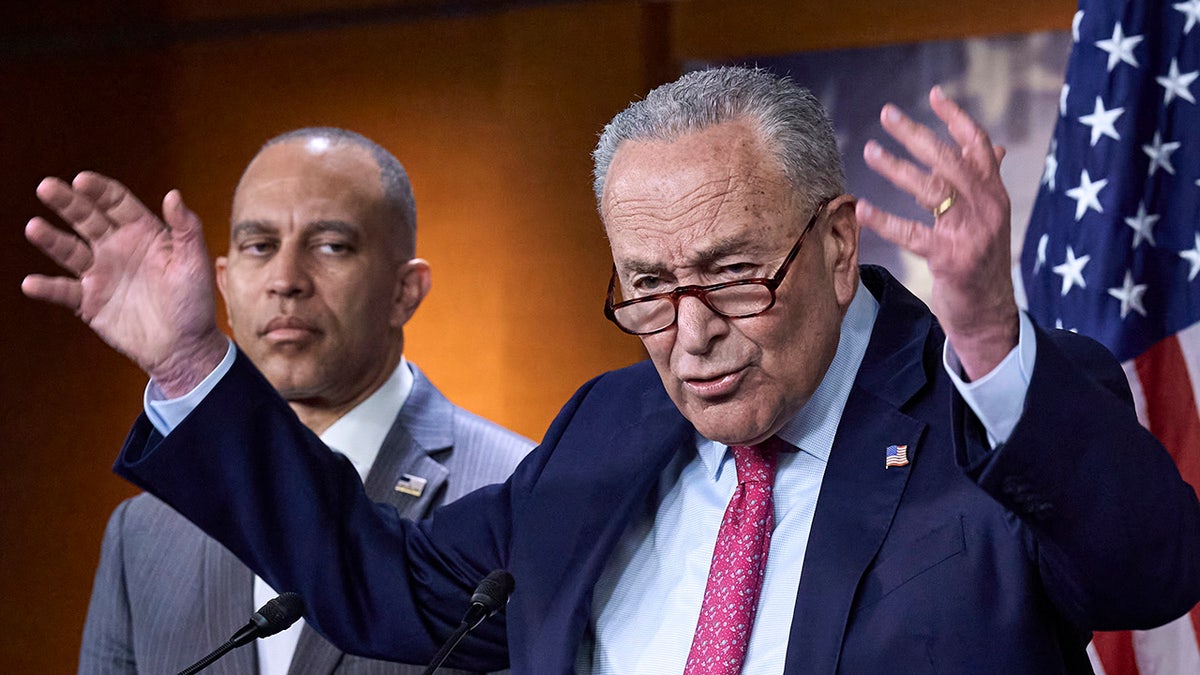
Senate Minority Leader Chuck Schumer, D-N.Y., and House Minority Leader Hakeem Jeffries, D-N.Y., left, hold a news conference on the GOP reconciliation bill, at the Capitol in Washington, Wednesday, June 11, 2025. (AP Photo/J. Scott Applewhite, file)
«To me, this is purely a hostage-taking exercise on the part of the Democrats,» Thune said. «We are willing to sit down and work with them on some of the issues they want to talk about, whether it’s an extension of premium tax credits, with reforms, we’re happy to have that conversation. But as of right now, this is a hijacking.»
Neither Schumer nor Jeffries took questions after their remarks, but appeared slightly more optimistic than their GOP counterparts after the meeting concluded.
«I think for the first time, the president heard our objections and heard why we needed a bipartisan bill,» Schumer said. «Their bill has not one iota of Democratic input. That is never how we’ve done this before.»
Vance said he was «highly skeptical» that it was Trump’s first time hearing the issue and said there was a bipartisan path forward on healthcare – but panned Democrats’ push to include an extension of COVID-19 pandemic-era Affordable Care Act (ACA) extensions in the bill.
«We want to work across the aisle to make sure that people have access to good healthcare,» he said, but added, «We are not going to let Democrats shut down the government and take a hostage unless we give them everything that they want. That’s not how the people’s government has ever worked.»
The meeting in the Oval Office comes after Trump canceled a previously scheduled confab last week with just Schumer and Jeffries. At the time, the president railed against their demands on his social media platform Truth Social and contended that congressional Democrats were pushing «radical Left policies that nobody voted for» in their counter-CR.
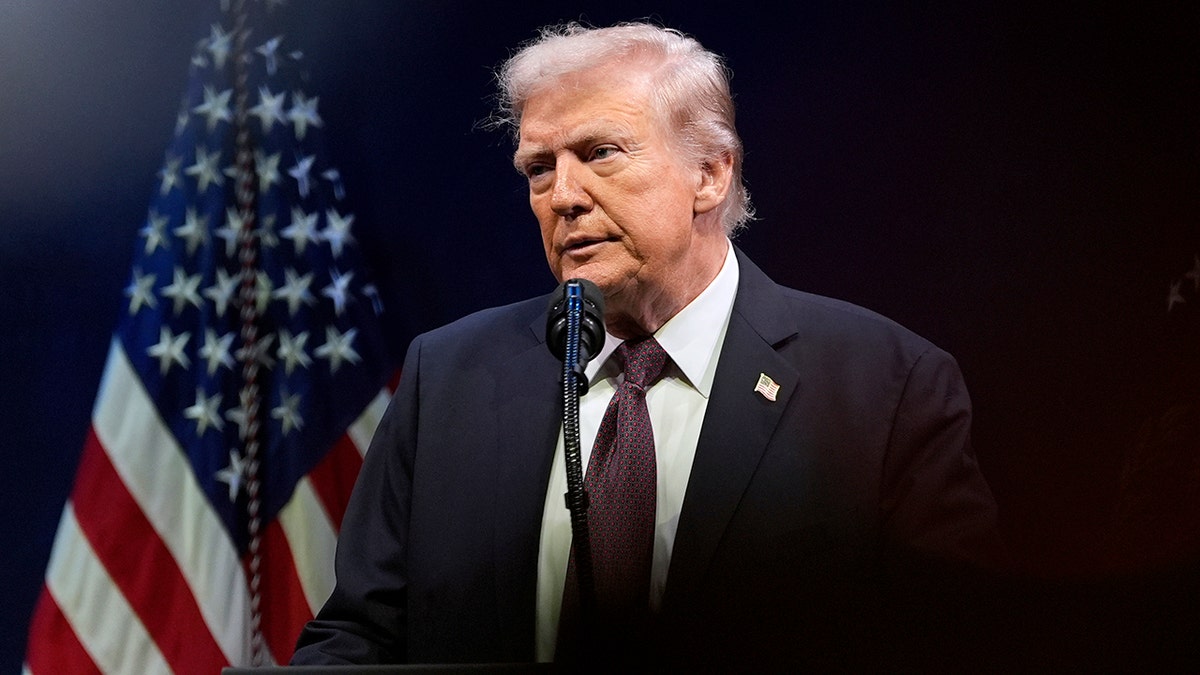
President Donald Trump speaks at a hearing of the Religious Liberty Commission at the Museum of the Bible, Monday, Sept. 8, 2025, in Washington. (AP Photo/Alex Brandon)
CLICK HERE TO GET THE FOX NEWS APP
Democrats’ demands center on an extension to expiring Affordable Care Act subsidies, though their counter-proposal also included language to repeal the healthcare section of the GOP’s «big, beautiful bill» and a clawback of canceled NPR and PBS funding.
Senate Republicans have argued that Democrats’ desires are unserious, and Thune has publicly said that Republicans would be willing to have discussions on the ACA subsidies, which are set to sunset at the end of this year, after the government is funded.
Schumer insisted Democrats needed it addressed immediately, however, in a press conference back on Capitol Hill after the meeting.
«We think when they say later, they mean never. We have to do it now, first because of the timing issue and second, because now is the time we can get it done,» he said.
The White House is also leveraging the threat of mass firings should the government shut down that go beyond the standard furloughing of nonessential employees. Still, Schumer and Senate Democrats have not buckled.
The Senate is expected to vote again on the bill on Tuesday.
politics,house of representatives politics,government shutdown,senate,jd vance
INTERNACIONAL
La reunión entre Trump y los líderes demócratas terminó sin acuerdo para evitar el cierre del Gobierno

La reunión entre los líderes demócratas del Congreso y el presidente estadounidense, Donald Trump finalizó este lunes sin que se alcanzara un entendimiento para tratar de evitar el cierre del Gobierno federal que se activaría a partir de este miércoles.
“Tenemos grandes diferencias en materia de salud y en su capacidad para revertir cualquier presupuesto que acordemos mediante rescisiones y embargos”, declaró a la prensa el líder de la minoría demócrata en el Senado, Chuck Schumer, al salir de la Oficina Oval de la Casa Blanca tras su reunión con el mandatario.
De acuerdo con los demócratas que asistieron a la reunión, se hizo ver a Trump “las consecuencias de lo que sucede en la atención médica al buscar recortes de seguros de salud”.
“Por su rostro, parecía que era la primera vez que escuchaba sobre este problema”, dijo Schumer a la prensa sobre la reacción del presidente durante el encuentro, en el que también estuvo el líder de la minoría demócrata en la Cámara de Representantes, Hakeem Jeffries, así como los líderes republicanos en la Cámara Alta y Baja, John Thune y Mike Johnson.
Por su parte, el vicepresidente estadounidense, J.D. Vance, dijo a medios al salir de la reunión: “Creo que nos encaminamos hacia un cierre porque los demócratas no harán lo correcto”.
En menos de dos días las expira el plazo para lograr un acuerdo de financiamiento para el Gobierno, y ambas partes insisten en señalar al opositor como responsable por no ceder.
Los demócratas exigen que se prorroguen los subsidios de la ley para el cuidado asequible de la salud (Obamacare) que expiran a final de año, así como la reversión de los recortes al programa Medicaid que resultaron de la gran ley de recortes presupuestarios y fiscales aprobada en julio pasado.
Sin embargo, los republicanos en el Congreso han dicho que aceptarán negociar ambos apartados solo si los demócratas dan su apoyo a un presupuesto provisional en una votación que tendría lugar mañana en el Senado y que mantendría el Gobierno operativo hasta noviembre.
Los republicanos presentaron el pasado 19 de septiembre ese presupuesto provisional en el Senado para su ratificación, pero este resultó rechazado porque su mayoría en la Cámara es insuficiente y requiere de al menos siete votos demócratas para la aprobación del proyecto de ley.
Al riesgo de una paralización del Gobierno federal se añade la posibilidad de despidos masivos de funcionarios públicos, según un memorando de la Oficina de Gestión y Presupuesto, que ha ordenado a las agencias que identifiquen programas clasificados como no esenciales para continuar su misión y reducir el personal federal.
Si el Congreso no toma medidas, miles de trabajadores del Gobierno federal podrían ser suspendidos, desde la NASA hasta los parques nacionales, y una amplia gama de servicios se verían interrumpidos.
Los tribunales federales podrían tener que cerrar y las subvenciones a las pequeñas empresas podrían retrasarse.
Los enfrentamientos presupuestarios se han convertido en algo relativamente rutinario en Washington en los últimos 15 años y a menudo se resuelven en el último minuto. Sin embargo, la voluntad de Trump de anular o ignorar las leyes de gasto aprobadas por el Congreso ha inyectado una nueva dimensión de incertidumbre.
Los demócratas han presentado un plan que prorrogaría la financiación actual entre siete y diez días, según fuentes del partido, lo que podría dar tiempo a alcanzar un acuerdo más duradero. Se trata de un plazo más corto que el respaldado por los republicanos, que ampliaría la financiación hasta el 21 de noviembre.
El líder republicano en el Senado, John Thune, trató de presionar a los demócratas programando una votación el martes sobre el proyecto republicano, que ya fracasó una vez en el Senado.
Ha habido 14 cierres parciales del Gobierno desde 1981, la mayoría de los cuales duraron solo unos días. El más reciente fue también el más largo, 35 días en 2018 y 2019 debido a una disputa sobre inmigración durante el primer mandato de Trump.
(Con información de EFE y Reuters)
Corporate Events,North America,Government / Politics,WASHINGTON
INTERNACIONAL
Estados Unidos publicó su plan para Gaza ante Benjamin Netanyahu: prevé que Donald Trump presida un comité de transición en la Franja y que se liberen los rehenes

 CHIMENTOS3 días ago
CHIMENTOS3 días agoFlor Jazmín Peña reveló la profunda crisis que tuvo por culpa de Nico Occhiato

 CHIMENTOS3 días ago
CHIMENTOS3 días agoMirtha Legrand bloqueó a una famosa periodista en WhatsApp y ella está desesperada para que le vuelva a hablar

 POLITICA2 días ago
POLITICA2 días agoFrancos apuntó al gobierno de Kicillof por el triple femicidio narco: “¿Qué dirá la gente que votó a Magario?»











